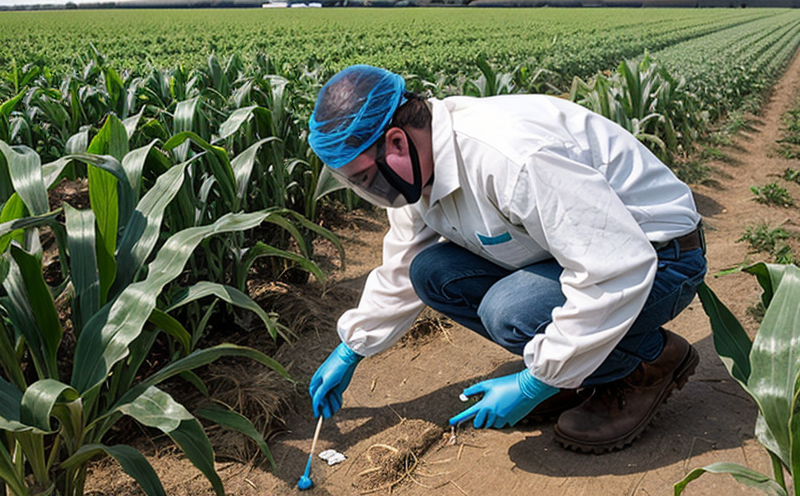Clothianidin Residue Testing in Crops
The Clothianidin Residue Testing service offered by Eurolab ensures the safety and compliance of agricultural products with international standards. Clothianidin, a neonicotinoid insecticide, is widely used for its effectiveness in protecting crops from pests while minimizing environmental impact. However, stringent regulations govern its use to prevent residues that could compromise food safety.
Our laboratory employs state-of-the-art analytical methods compliant with ISO/IEC 17025:2017 and other relevant international standards to conduct thorough testing of Clothianidin residues in various crops. The testing process involves meticulous sample preparation, extraction, purification, and quantification using Liquid Chromatography-Mass Spectrometry (LC-MS/MS) techniques.
The scope of our service includes the analysis of Clothianidin in grains such as wheat, corn, and rice; fruits like apples, oranges, and berries; vegetables including tomatoes, carrots, and spinach; and oilseeds such as sunflower seeds. This comprehensive approach allows us to provide reliable data for regulatory compliance and quality assurance.
The acceptance criteria for Clothianidin residues are set according to the European Union Maximum Residue Levels (MRLs) specified in Directive 2015/793/EU, as well as other international standards such as Codex Alimentarius. Compliance with these guidelines is crucial for maintaining consumer trust and ensuring that agricultural products meet global market requirements.
Our team of experienced chemists and technicians ensures that each sample undergoes rigorous testing to achieve accurate results within specified tolerances. The use of advanced instrumentation guarantees precision, while adherence to standardized protocols maintains consistency across all tests.
In addition to routine testing, we offer tailored services for R&D purposes, helping clients optimize pesticide application practices without compromising crop protection. By providing detailed reports on Clothianidin residues, our laboratory supports informed decision-making at every stage of the production process – from field trials to final product release.
For quality managers and compliance officers, this service offers peace of mind regarding regulatory adherence. For R&D engineers, it provides valuable insights into optimal usage scenarios. And for procurement teams, reliable test results ensure consistent supply chains free from non-compliant materials.
The importance of Clothianidin residue testing cannot be overstated in today’s highly regulated agricultural landscape. By leveraging our expertise and technology, Eurolab helps clients navigate complex regulatory environments while fostering sustainable practices that benefit both the environment and human health.
- Compliance with EU MRLs and other international standards
- Advanced LC-MS/MS instrumentation for precise quantification
- Flexible service offerings including routine testing and R&D support
- Detailed reports supporting informed decision-making
We are committed to delivering accurate, reliable results that meet the highest industry standards. With Eurolab’s Clothianidin Residue Testing services, you can rest assured that your agricultural products are safe, compliant, and ready for market.
Eurolab Advantages
At Eurolab, we pride ourselves on offering unparalleled expertise in pesticide residue testing. Our state-of-the-art facilities combined with our team of highly qualified professionals make us the premier choice for Clothianidin Residue Testing.
- Innovative Technology: Utilizing cutting-edge Liquid Chromatography-Mass Spectrometry (LC-MS/MS) technology, we ensure precise and accurate detection of even trace amounts of Clothianidin residues in crops.
- Comprehensive Services: Beyond routine testing, Eurolab provides customized solutions for R&D purposes, helping clients refine their pesticide application strategies while maintaining effective crop protection.
- Regulatory Compliance: Our services are fully aligned with European Union Maximum Residue Levels (MRLs) as well as other international standards like Codex Alimentarius. This ensures that your products meet all necessary regulatory requirements, enhancing market access and consumer confidence.
- Rapid Turnaround Times: Leveraging our efficient workflows and advanced equipment, we strive to deliver timely results without compromising on quality or accuracy.
- Expertise & Experience: Our team comprises seasoned chemists and technicians who possess deep knowledge of agricultural testing methodologies and trends. They bring extensive experience in handling diverse sample types ranging from grains to oilseeds.
By choosing Eurolab for your Clothianidin Residue Testing needs, you gain access to a comprehensive suite of services designed specifically to meet the unique challenges faced by today’s agricultural sector. Our commitment to excellence ensures that every client receives personalized attention and support throughout their testing journey.
Quality and Reliability Assurance
The quality and reliability of our Clothianidin Residue Testing services are paramount, reflecting Eurolab's unwavering dedication to delivering accurate results consistently. To achieve this level of excellence, we implement robust quality management systems that adhere strictly to ISO/IEC 17025:2017 standards.
Our laboratories are equipped with the latest analytical instruments capable of detecting minute levels of Clothianidin residues in crops. These sophisticated devices include Liquid Chromatography-Mass Spectrometry (LC-MS/MS), which provide high-resolution data essential for accurate quantification. This instrumentation not only ensures precision but also enables us to stay ahead of evolving regulatory requirements.
Sample preparation plays a crucial role in ensuring accurate testing outcomes. Each sample undergoes standardized procedures tailored specifically for Clothianidin residue analysis, ensuring consistency and repeatability across all tests. From initial collection through final extraction and purification steps, every stage is meticulously documented to trace any potential variations or anomalies.
Data processing and interpretation are conducted by our skilled chemists using software tools designed explicitly for pesticide residue analysis. This ensures that raw data from the instruments are accurately transformed into meaningful results aligned with relevant standards. Furthermore, rigorous validation processes are employed to confirm the reliability of analytical methods used in our testing protocols.
Our commitment to quality extends beyond technical aspects; it encompasses continuous improvement efforts aimed at enhancing overall service delivery. Regular training programs for staff members keep them updated on advancements in technology and methodologies while fostering an environment conducive to innovation within the laboratory.
Certified personnel operating under strict adherence to standard operating procedures (SOPs) further bolster our commitment to excellence. These SOPs cover everything from sample handling through final reporting, ensuring that every step is performed consistently with best practices established by recognized bodies such as ISO/IEC 17025:2017.
By maintaining these stringent quality controls, Eurolab ensures that clients receive dependable results they can trust. Our dedication to excellence has earned us a reputation as leaders in agricultural testing services globally.





